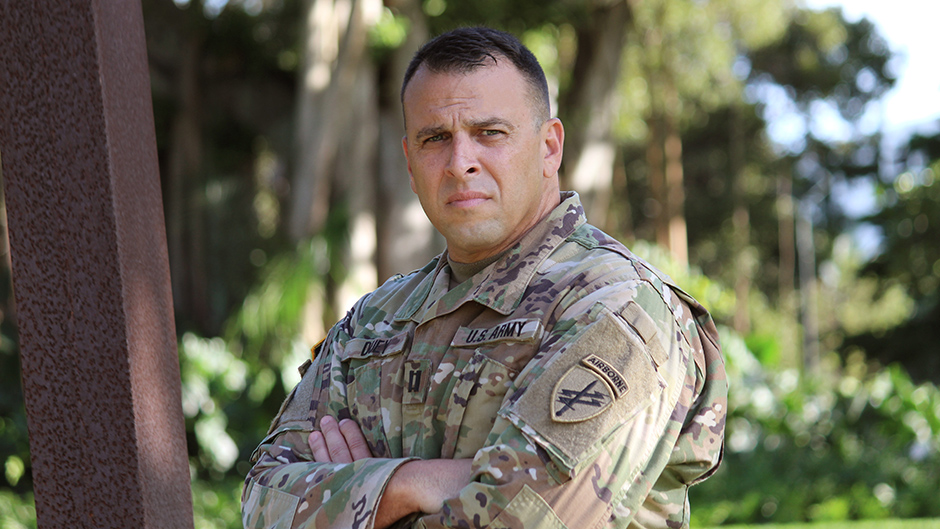Jason Scott Duey obsessed about soldiers as a kid in Miami Lakes. He and his friends played battle games. Duey had toy soldiers and built models of tanks and planes. He joined the military at 18.
"My grandfather and uncle were military; it was something I always wanted to do so I did," the 46-year-old says. "My father was all for it; my mother was very scared. My first deployment was in Desert Storm in 1990-91. I was there as a radio/telephone operator, which is the guy who hangs near the commander with the radio that gets killed first because they have all the antennas on their back."
An Undergrad in the Reserves
Duey switched to reserve duty to go to St. Thomas University for a degree in Political Science. While there, Duey took up flying as a hobby and flew humanitarian missions for Brothers to the Rescue, the Cuban opposition group.
"We were dropping bags of bottled water and food," Duey says. "And radios so we could communicate with the rafters until they got to Cay Sal (a small island between Cuba, the United States, and the Bahamas on the Cay Sal Bank) or another island where they could beach until the Coast Guard could get them, instead of drown."
Active duty and Officer Candidate School was his next stop on his journey. "I had always wanted to go to college; I just didn't have the means to do it," he says. "It's a prerequisite to become a candidate to become an officer. Before they even look at you, you have to have a college degree."
Duey was soon in command, as a Second Lieutenant Platoon Leader, charged with 36 soldiers in the infantry deployed in Operation Enduring Freedom to Afghanistan. He returned as a First Lieutenant and Executive Officer of a company, traveling to Poland to train the country's Special Forces. From there Duey went to Panama where he worked with the country's border patrol to push back the Colombian guerrilla forces, the FARC, back across the border.
The Road to Law School
Promoted to Captain, Duey led a company for his last rotation in Afghanistan. He jokes that he is a fast runner, but not quite fast enough to outrun a Hummer, which landed him in a ditch with a broken hip, kneecap, and spinal injuries. After medical transfer and six months in an Army hospital, his marching days were over.
Faced with a new direction, the heavily decorated officer weighed his options. "I did a stint in JAG (Judge Advocate General's Corps)," he says. "As an officer, we can prosecute administrative cases. Consequently, I was given administrative separation actions to prosecute. I got a taste of law and whetted my whistle, or whetted my beak in wanting to practice law."
Duey received his J.D. at Florida A&M College of Law before coming to Miami Law for an LL.M in International Arbitration. In law school, Duey interned with the U.S. Department of State in Acca, Ghana providing legal analysis and opinion to senior American diplomatic personnel on Ghanaian legislation's potential impact on U.S. interests.
Duey also interned with the North Atlantic Treaty Organization in Mons, Belgium, drafting legal position papers, memoranda, and agreements regarding complex multi-national legal issues as well as participating in NATO and United Nations policy and use of force agreements.
He is still in the Army, as a senior advisor to the Afghan National Army, providing legal and technical advice to senior Afghan governmental and military officials.
International Arbitration at Miami Law
Duey came to Miami Law to study maritime law, but after attending Jan and Marike Paulsson's international arbitration class, he switched.
"I've lived on five continents. As most of the world was watching events happen on TV, and I was there," he said. "I've lived all over the U.S. and Europe, I've lived in Japan and South America, and obviously I've lived in Afghanistan and Kuwait, and not on base, but remotely with host nationals. I have had the experiences that are unique in the realm of international arbitration; I have the cultural sensitivity and understanding of the complexities of international relations that most Americans do not have."
Duey is well on his way to his goal. He recently traveled with the Paulssons to Mexico to attend a national judiciary for the International Commercial Arbitration Association's roadshow to discuss the intricacies of the New York Convention's international treaties as it relates to domestic law and the enforcement of arbitral awards or judgments.
"I felt like I was sitting at the masters' knees," he says. "It was one of the best things I've done at Miami Law. It was education outside the classroom to watch the interaction with the judiciaries at the Supreme Court of Mexico. It strengthens my skills, and I developed a small network at that level that I hope to expand in the future by connecting with international arbitrators outside the U.S."
After graduating in May, Duey looks forward to the next assignment. "Of course I would like to do international arbitration for White & Case or Baker McKenzie," he says. "I know it is going to take a while. I need to get my bones made in arbitration, and I am starting from the beginning as a 46-year-old. But that's okay; I don't mind, and I'm not too proud."
But proud is what he should be.

